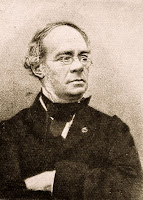 |
| "Le Mozart des Champs-Elysées" ("The Mozart of Champs-Elysées") Jacques Offenbach turns 197 today. |
The gorgeous barcarolle for soprano and mezzo soprano, from the opera’s third act, “Belle nuit, ô nuit d'amour" (Beautiful night, o night of love), and the entire work itself have become staple pieces in the West, with the famous barcarolle often finding itself enhancing many and varied soundtracks of mainstream and independent film, and Les Contes itself greatly assisting in the dogged quest of making for it’s creator a household name.
Les Contes d’Hoffmann’s popularity is especially notable, as both the work and it’s composer would have experienced many roadblocks along the journey to success.
Jacques Offenbach, born Jacob Offenbach 197 years ago today on June 20, 1819 at Cologne in Prussia (in what is present day Germany), was the 7th child of a family of 10 by Jewish parents. Although young Jacob showed signs of exceptional musical aptitude as early as the age of nine years, having already mastered the violin with astonishing and “terrifying” ability, and having begun the practice of composition and had recently taken up the cello, Prussian musical society in the early 19th century would prove problematic for musicians of Jewish origin looking to advance in their practice or trade and make a name for themselves across the continent.
Jacob’s father Isaac, would send his son west, to France by the age of fourteen alongside elder brother Julius, aged 18 - also musically gifted - to study in Paris.
 |
| An esteemed Italian in Paris: composer and Paris Conservatoire Director Luigi Cherubini |
It would only be after much persuasion on the part of Isaac Offenbach that the pubescent Jacob would be made allowed to audition. Moments into the young prodigy’s performance, Cherubini abruptly called for silence, allegedly remarking to Isaac’s most gifted son
“Enough, young man! You are now a pupil of this Conservatoire!"
It would be during this period that Jacob would become Jacques, and where the former singer and violinist would begin to hone his skills as a virtuoso of the cello. Although having spent only a year within it’s precincts, it would be at the Conservatoire that Jacques would find himself rubbing shoulders with classical music’s elite, and instilling within himself a very powerful sense of his own self worth as a musician. Very soon after voluntary withdrawing from the Conservatoire, Offenbach would enter into the cello tutelage of one Louis-Pierre Norblin, and join the Opéra-Comique orchestra as a cellist where he would even further refine his skills earn the distinction of one of the finest cellists on the continent. Jacques would also study composition under maestro Fromental Halévy of La Juive fame.
 |
| French composer Fromental Halévy would prove instrumental in young Jacques early foray into the art of musical composition. |
Within three years of Jacques indoctrination into musical theater, the Prussian prodigy would find himself for the first time beginning to build a reputation outside of Cologne and Paris, as his satirical 1858 operetta Orphée aux enfers causes a sensation in France and eventually attracts the attention of the Second French Empire under Napoleon III, who would later grant the Prussian émigré French citizenship and the much prestiged Légion d'Honneur (a distinction shared by former tutor Luigi Cherubini). Offenbach’s reputation as a master of the operetta would extend to Vienna, which enabled the former Prussian national to introduce into musical Viennese society several of his successful works then unknown to it's high art-loving patrons.
Unfortunately for the newly minted Frenchman, nationalistic pride spurned on by the revolution combined with an ill-suited business sense would plunge the composer into bankruptcy as the European populous divided into sects following France's defeat by the Prussians in 1871. Once more, Jacques was viewed by the public as Jacob – Prussian intruder.
Les Contes d’Hoffman (The Tales of Hoffmann, based on three short stories penned by author and composer E.T.A. Hoffmann) would finally achieve international fame, although, household name status would arguably not be seen until well after the composer’s passing, at the height of the twenty-first century, following a series of incomplete performances (said to have involved the much beloved barcarolle and the opera’s third act), a gas explosion and resulting fire at a separate, full-feature performance in 1881, and a further fire 6 years later in 1887 at the Opéra-Comique which had destroyed much of the orchestral parts – and the onset of the second world war, wherein composers and works created by musicians of Jewish origin found themselves frowned upon and/or had been made the subject of bans in many parts of Europe.
It would only be in a post-war Europe that Jacques Offenbach’s magnum opus would be re-introduced into high musical society and made allowed to flourish, unhindered by the many historical roadblocks that had been forced upon it’s composer.
Sadly, it was a level of infamy unknown to Offenbach during his lifetime.
Enjoy below the beautiful “Belle Nuit…” by Jacques Offenbach featuring mezzo soprano Elīna Garanča and soprano Anna Netrebko, and
marvel at the acoustic beauty that may have never been:
-Rose.


No comments:
Post a Comment